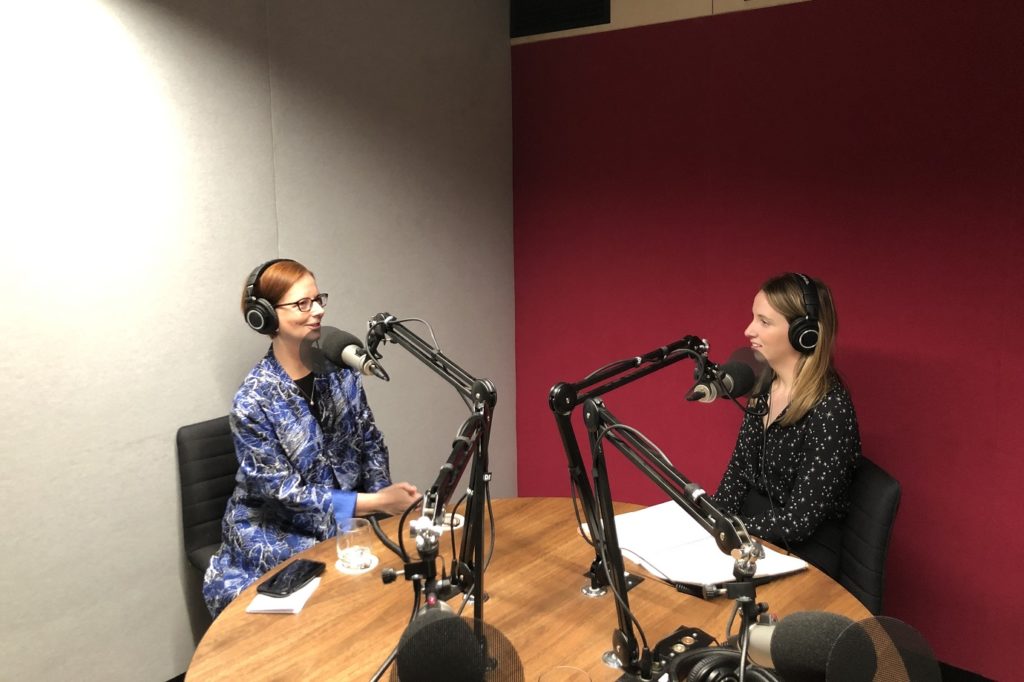“Gender doesn’t explain everything, it doesn’t explain nothing, it explains some things.”
These words, spoken by Julia Gillard during her last speech as Australia’s first female Prime Minster, still resonate with many, and for her, they still ring true.
In the years since she uttered those words, she’s developed the ability to able to cite her own experiences as female leader in the context of the body of research about how women leaders are seen and perceived.
As Chair of the Global Institute for Women’s Leadership, it’s been fascinating to learn alongside a research team.
“In some ways, it’s been emotionally relieving,” she says. “Because there was always a question in your mind, ‘How much of this is me? How much of this is about gender?’ And looking at the research has helped me answer some of those questions to myself, for myself.”
On the latest episode of the Women are the Business podcast, Gillard sat down with host Sophie Thomas, to talk all things women in leadership. She discusses key roadblocks to true gender equality, how she looks back on her career now with the benefit of hindsight, and fills us in to what she’s been up to since she left politics.
Gillard says even with hindsight, she still thinks about the significance of her time as Australia’s first female prime minster the same way she did when she took on the role. She’s always been cognizant of her place in history.
“I was certainly conscious when I was being sworn in by Quentin Bryce, the first woman to serve as Governor-General, that this was a moment in Australian history,” she says.
“I kind of caught the excitement in Quentin’s eyes that she was getting to be the one who was the Governor-General who swore in the first female Prime Minister, and that made a big impact on me.”
In the podcast, Gillard talks about what she believes are the three biggest issues when in comes to women in leadership in 2020.
Number one, is the inability for women to find structures and supports to help them balance work and family life.
“I think for many women who start their careers very motivated, very wanting to get right to the top, there is a drift away in mid-career and it’s often at the time of family formation,” she says.
As she explains, statistics clearly show that even for men and women who both work full-time in comparable occupations, it’s women who disproportionately do the work at home. They’re also the ones caring for children and elderly relatives.
Second, she says, is the continuation of sexist stereotypes and unconscious bias. And beyond the stereotyping about what leadership looks like, is the third issue – how we value merit.
“There’s a lot of gendered assumptions about how to network, who stands out, who appears to have charisma, who can be in the office for long hours, which all tend to bias against women.”
So, who’s responsible for changing the landscape for women in leadership?
For Gillard, she thinks it often comes down to female activists with male supporters campaigning for it. Then governments and institutions respond. And it’s important everybody in that chain steps up to the plate.
“Women, I think, need to mobilise, women in powerful and decision-making positions need to use their power for change. But every word in that sentence applies to men as well.”
“And that’s I think fundamental in the sense that equality is a right that we should be extending to all. And so we should all care about it.”
One thing that’s surprised Gillard when learning more about gender equality, was some research revealed by Blair Williams from the Australian National University.
“She did a comparison of the newspaper reporting in the two weeks after Margaret Thatcher became Prime Minister of the UK way back in 1979 and the two weeks after Theresa May became Prime Minister, only to find that the reporting is more gendered now,” Gillard says.
“Now, newspapers will go far more shock horror to try and shift newspapers off the shelves and into people’s hands. They’re much more likely to focus on appearance and other issues for women.”
And what does she think about feminist backlash? The people who say “we’re sick of talking about diversity?”
“I think it’s real and I think we’re seeing it in politics in many parts of the world, a very strong backlash,” she says. “And I think we see it on social media where the misogyny and threats of violence and vileness that greets women who step out into the public square, particularly around feminist issues, is just truly horrifying.”
“In some ways think it’s inherent in any struggle for change that there’s action and reaction.”
“And that is the way in which our societies digest big agendas, big needs for change, and then we come out the other end and by the time the change has happened, we then look back at that history and say, “What was that all about?”
We’ll be featuring stories on all eight episodes of this podcast here on Women’s Agenda, thanks to our partnership with the Faculty of Business and Economics at The University of Melbourne.
Subscribe to the series on Spotify or Apple Podcasts.
Click here to see the full: #WomenAreTheBusiness series


